It’s fair to say that in 2025 Curtis Mayfield is still underrated. The Chicago-born singer-songwriter, producer, guitarist and record label boss died back in 1999, aged just 57, after having spent a whole decade as a quadriplegic, paralysed from the neck down after a stage lighting rig fell on him at an outdoor concert in Brooklyn in August 1990. That decade-long slide into silence may have had something to do with it, but even within rock and soul literature he’s never mentioned in the same breath as Stevie Wonder, Al Green, Sly Stone, Aretha Franklin, James Brown or Marvin Gaye though he arguably achieved more than all of them.
-
READ MORE: Stevie Wonder’s 20 Greatest Deep Cuts
Raised in poverty, a high-school drop-out and teenage gospel singer in his grandmother’s church, Mayfield formed the Impressions with high-school friend Jerry Butler in 1956, aged just 14. Blending soul melodies with gospel harmonies, politically conscious lyrics, and a distinctive, self-taught rhythm-guitar style (influenced by Andres Segovia) that would come to influence Jimi Hendrix, The Impressions had a string of Top 20 US chart hits before Mayfield left the group in 1969 to go solo and concentrate on his just-launched record label, Curtom. As songwriter, composer, producer, A&R man, and CEO, Mayfield created a powerful soul stable at Curtom, releasing a string of great albums, many of them co-written and produced by himself. In fact, an alternate top ten could be compiled solely from LPs Mayfield produced and co-wrote during that time, including Gladys Knight & the Pips’ Claudine, Aretha Franklin's Sparkle, The Staples Singers’ Let's Do It Again, Baby Huey’s The Living Legend. But with this list, we’ve decided to concentrate on the studio albums that best expressed his individual talents and encapsulated Mayfield’s genius, albums that expressed the hope and pain, the pride and prejudice of African-American life and did so with a defiant, unifying power but also a rare poetic vulnerability. In concentrating on those studio albums we’ve purposefully ignored Best Of’s. That’s partly because streaming has done away with the need for a standard Best Of but also because, there is still so much in the Mayfield vaults that is in need of a definitive archive box-set. He’s more than deserving of the gesture. For, more than Stevie Wonder, more than Marvin Gaye, Al Green, Aretha Franklin, Sly Stone or James Brown, the music of Curtis Mayfield captures the duality of the Black American experience; the highs, the lows, the euphoria and the depression. A vision of the world, as he sang on Right On For The Darkness, “that put its heavy weight on me”.
10.
Curtis Mayfield - New World Order
(Warner Bros, 1996)

Although paralysed from the neck down, Mayfield carried on writing songs, singing by lying down and letting gravity press down on his chest and lungs. Recorded line-by-line, assisted by Roger Troutman and TLC/OutKast production team Organized Noize, and with a guest appearance from Aretha Franklin (on Back to Living Again, crying out “Right on, go ahead Mayfield”) New World Order is too long at 60 minutes but the album’s highlights are many and the title track, Back To Living Again, Just a Little Bit Of Love and the astonishing Here But I’m Gone (written from the perspective of an ageing crack addict) all possess a laid-back Atlanta R&B groove that has aged exceptionally well.
You say: “A heartbreaking listen but the genius is still audible and I love the Organised Noize production.” Martin Baylis via mojo4music.com
9.
The Impressions - Keep On Pushing
(Curtom ABC-Paramount, 1964)
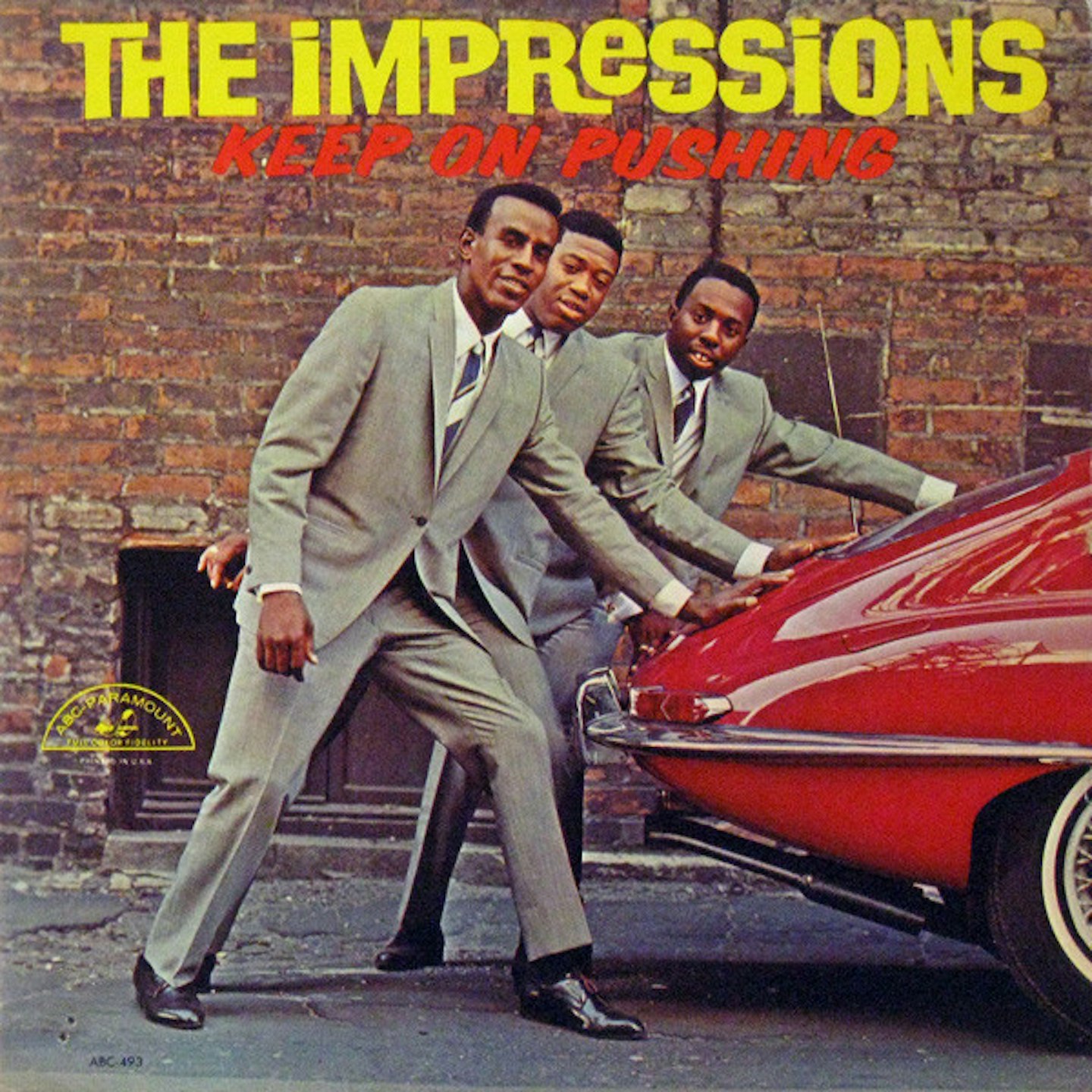
One of the great soul albums of the early 1960s. Mayfield wrote the gospel-soul title track “to help motivate the people” after seeing the divisions in the Civil Rights movement, but what astonishes is how emotionally coherent the entire album is. That’s largely down to the beautifully arranged vocal harmonies from Fred Cash and Sam Gooden but also the standard of the other tracks, from the haunting torch song I’ve Been Tryin’ and the gospel-march of Amen to soul confessional I Made A Mistake and declamatory call-and-response floor-filler I Love You (Yeah). Also, it’s one of the great early showcases for Mayfield’s exceptional (and hugely influential) open F# guitar style.
You say: "Was there a more beautiful vocal trio than Mayfield, Cash and Gooden? Just heavenly." Carey Lake via email
8.
Curtis Mayfield - Got To Find A Way
(Curtom, 1974)
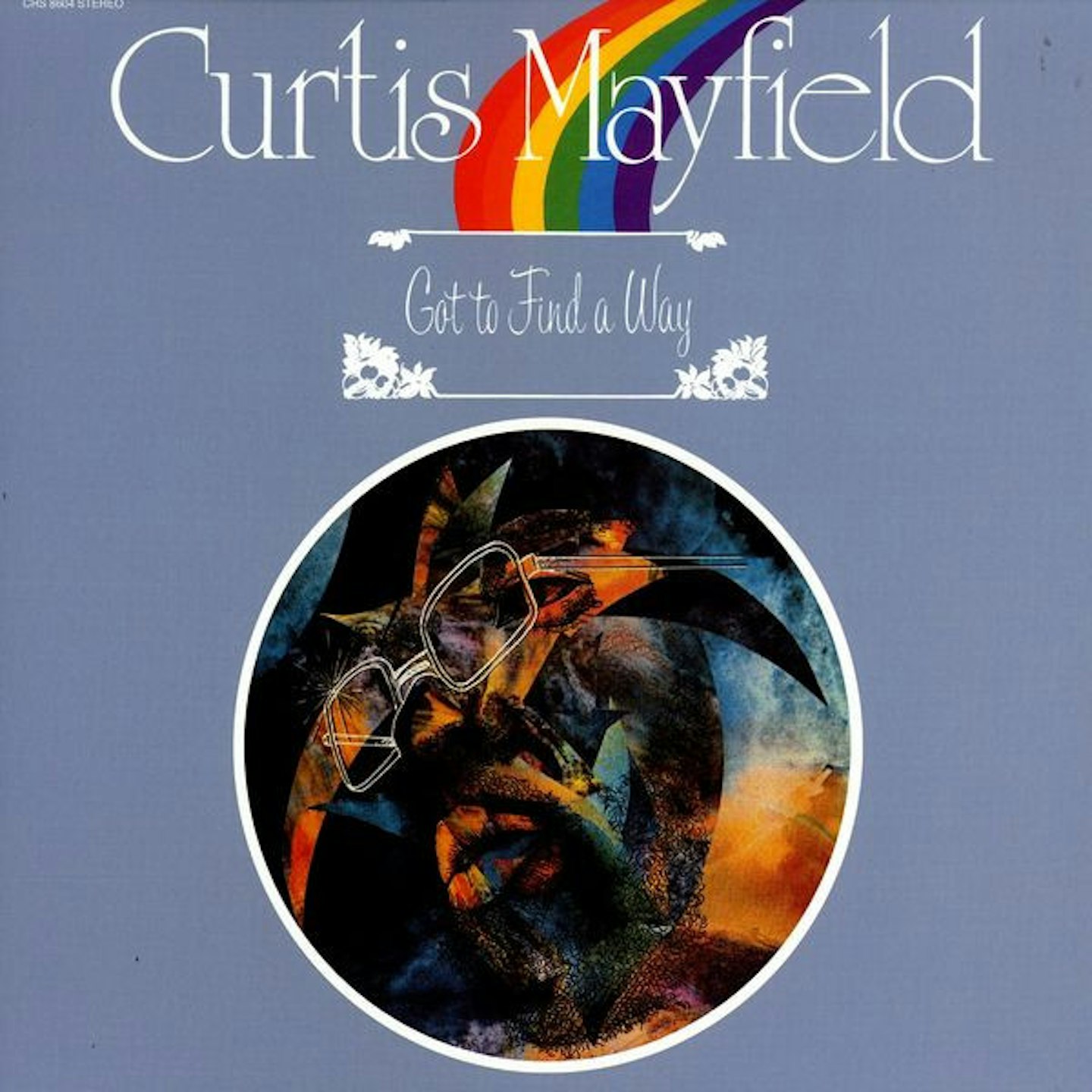
In 1974 Mayfield was responsible for three great studio albums, Sweet Exorcist, the film soundtrack Claudine (cut with Gladys Knight And The Pips), and Got To Find A Way. Overworked, exhausted, feeling that the mood of the country had changed, these are more personal than political albums. Got To Find A Way is arguably his most emotionally complex album, weighted with disillusionment where songs of seductive eroticism (Love Me (Right in The Pocket)) sit next to despairing heartbreakers (So You Don’t Love Me), Impressions gospel soul (A Prayer) is now imbued with weariness and the sole political song (the orchestral funk of Cannot Find a Way) is essentially a political songwriter admitting defeat. It was the biggest flop of his career to that point.
You say: "His most overlooked album, IMO and the one I thrust on friends who only know him for Superfly." Ian Benson via mojo4music.com
7.
The Impressions - The Young Mods’ Forgotten Story
(Curtom, 1969)

In 1968 Curtis Mayfield abandoned The Impressions’ dual vocal style and wrote a personal song from the heart that addressed the deaths of Martin Luther King and Robert Kennedy. Entitled This is My Country it changed the direction of the group forever, allied Mayfield with Black Power and informed two of the group’s late, great records, 1968’s This is My Country and 1969’s Young Mods.… Both are essential but Mods, recorded in the wake of the student protests at the 1968 Chicago Democratic National Convention, is the most focussed of the two and its cover, with Mayfield modelling his long, leather German overcoat, is a statement of stylish defiance in and of itself.
You say: “A perfect album, sleeve, title, contents. My Deceiving Heart is his most beautiful performance. It’s glorious.” Natural Conker @bookworm_north via Twitter
6.
Curtis Mayfield - Curtis
(Curtom, 1970)

Mid-way through recording the Impressions’ 13th studio LP, Check Out Your Mind, Mayfield announced he was quitting the group. Yet while the growling eight-minute apocalyptic acid-funk of (Don’t Worry) If There’s A Hell Below, We’re All Going To Go and the exultant positivity of the bustling, nine-minute version of Move On Up signalled the arrival of a more defiantly political songwriter, much of this solo debut is low-key psychedelic soul, still rooted in the sorrowful sound of late-era Impressions. That’s not to say that The Other Side Of Town’s string-laden ghetto melancholy, and We The People…’s questions of self-identity aren’t exquisite exercises in melodic introspection but there would be stronger solo Curtis albums to come.
You say: “The pivotal album between the Impressions and his stellar solo career. Sounds like a greatest hits album.” Judah Warsky @JudahWar via X
5.
Curtis Mayfield - Roots
(Curtom, 1971)

Working with a tight, road-hardened band, Mayfield’s second solo album is the sound of a naturally reflective artist reinvigorated. Beginning with the dance floor sensuality of Get Down Roots is, for the most part, one of his most hopeful solo LPs, best encapsulated in the infectious anti-war anthem We Got To Have Peace and the epic black-power groove Beautiful Brother Of Mine. Of course, it wouldn’t be a Mayfield album without a touch of dark introspection, and he nails it in the dystopian groove of Underground and Keep On Keeping On which looks at black society in 1971 and says “Many think that we have blown it / But …there’s still a lot of love among us.”
You say: “He really finds a different voice with this album, and the music is just sublime. Deeply contemplative.” Johnny Mains @ohsinnerman via X
4.
Curtis Mayfield - Back To The World
(Curtom, 1973)

Recording with a new band after bidding farewell to Johnny Pate and guitarist Craig McMullen, deep in a well of paranoia following his failure to win a Grammy for Super Fly, Back To The World is Mayfield’s anti-Vietnam LP. Touring army bases he’d hear the phrase spoken by soldiers returning home and wrote this semi-concept LP about a veteran faced with no job, no woman, no money. Low key, bitter, melancholy, it’s also a lean, attenuated album, the production closer to the high-frequency sibilancies of disco than funk. But it’s a sound that is also subtly seductive, with Phil Upchurch’s chicken-scratch guitar and Rich Tufo’s melancholy strings all swirling under the surface of Mayfield’s forlorn falsetto.
You say: “Curtis' answer to What's Going On, a layered and thoughtful album that rewards repeated listening.” @EddieRobson via X
3.
Curtis Mayfield - Super Fly
(Curtom, 1972)
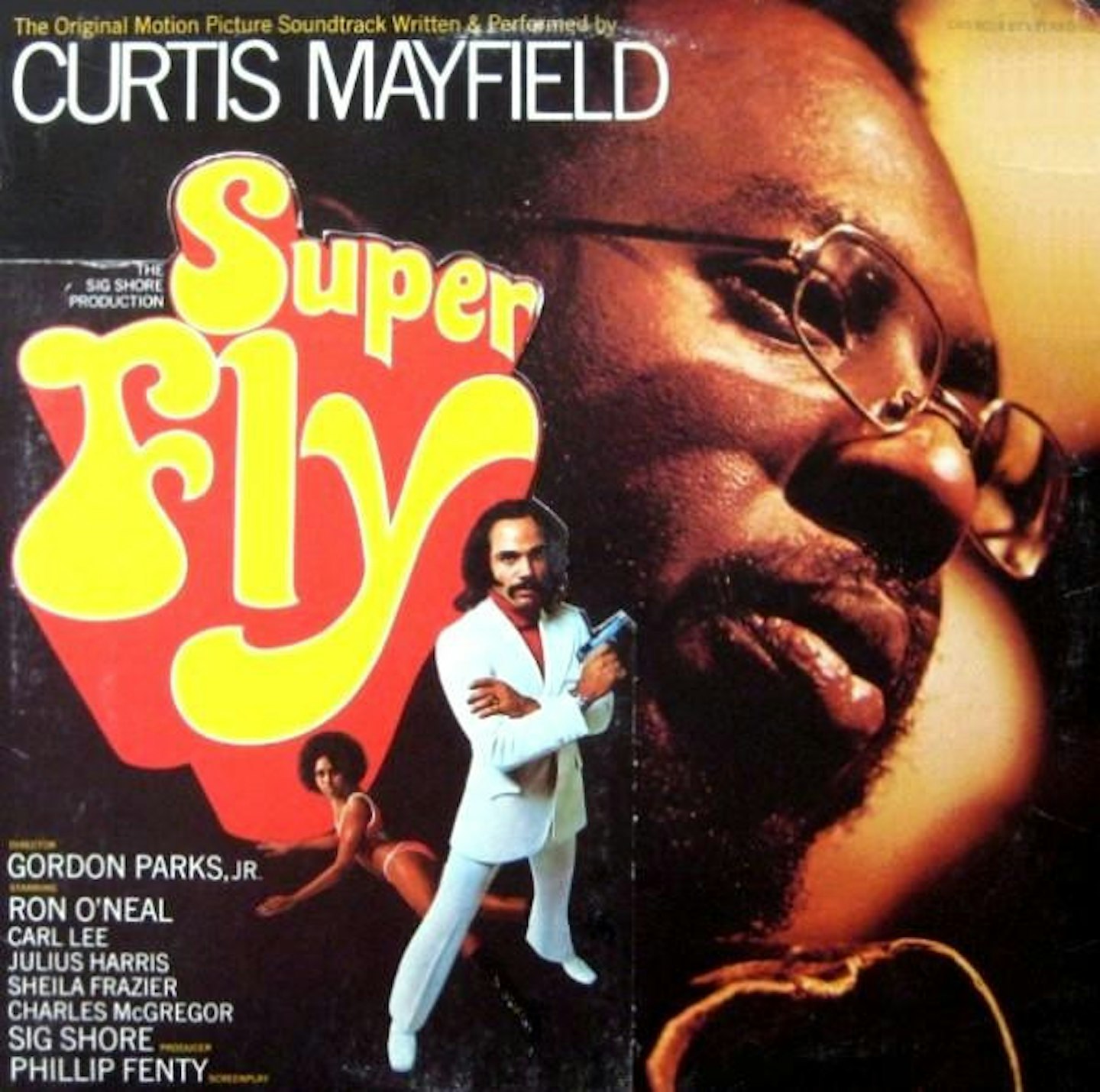
In late 1971, when Curtis Mayfield was sent the script for Gordon Parks Jr’s urban noir, Super Fly, the term “blaxploitation” was still in its infancy. Watching the film today, it’s clear Mayfield’s quality control was higher than Parks’. Collaborating with arranger Johnny Pate, Mayfield crafted a masterpiece that invests this low-budget street thriller with an almost auteurist narrative, each of his driving two-chord falsetto raps (Pusherman, Superfly, Freddie’s Dead, Little Child…) commenting on the film’s two-dimensional characters and giving them with a much-needed depth and humanity. And Pate’s dazzlingly intricate arrangements, cut with a live orchestra, are essential, investing Mayfield’s melancholy street tales with an eerie, kaleidoscopic richness.
You say: "The film would have been immeasurably reduced without its marriage of lyrical heaviness and soaring funky orchestral tightness." @boscobel19751 via X
2.
Curtis Mayfield - Curtis/Live!
(Curtom, 1971)
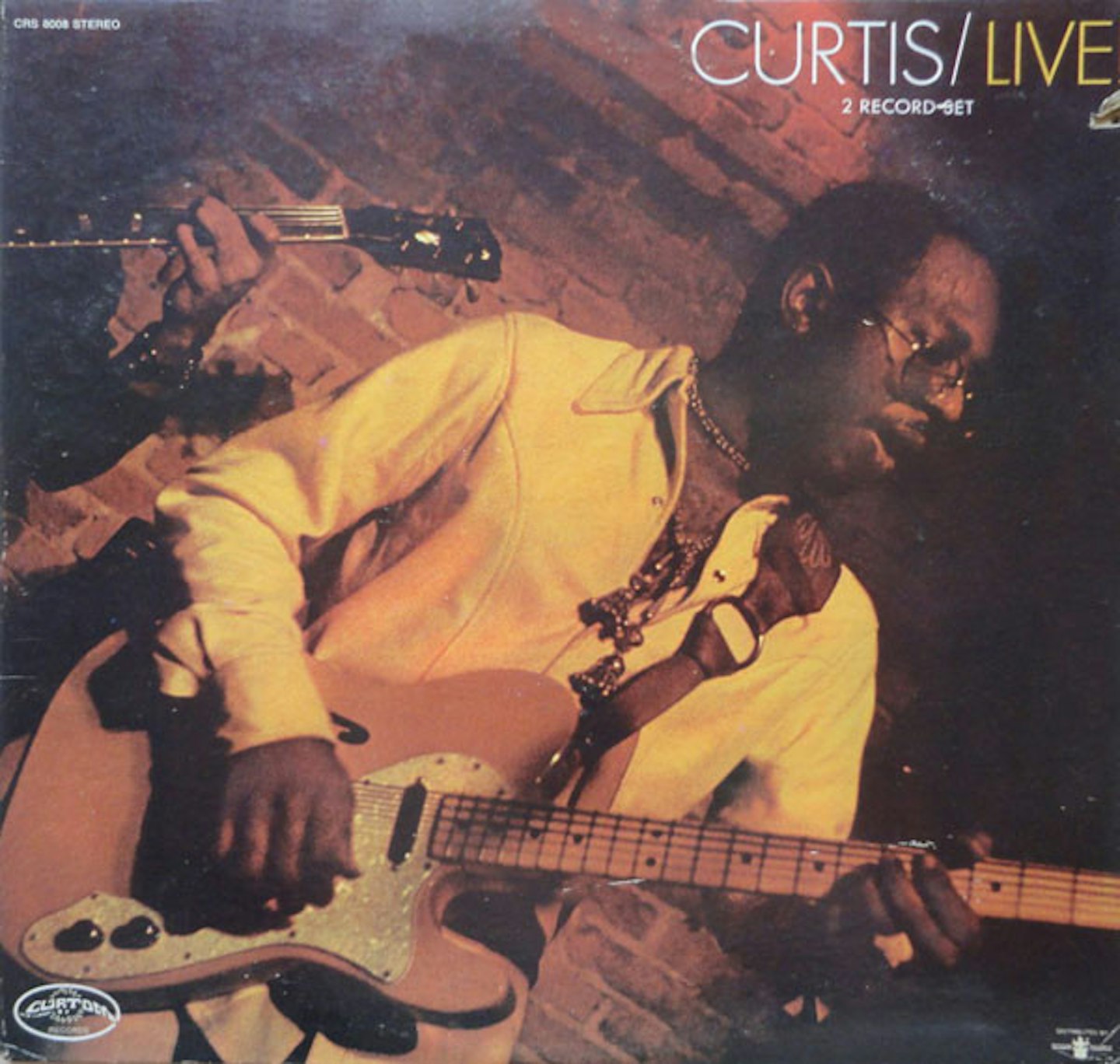
Recorded during a bitterly cold January in 1971, in the cramped environs of New York’s Bitter End, and edited with Hendrix’s old engineer, Eddie Kramer. Curtis/Live! is a classic act of Mayfield mercurialness, the unveiling of a new band for their first ever dates, documented on a double LP. Comprised solely of guitarist Craig McCullen, bassist Joseph Scott, drummer Tyrone McCullen and percussionist ‘Master’ Henry Gibson this might be one of the greatest live albums ever released, not for its power but for its seductive pared-down intimacy. Witness the way Mayfield and band subtly transform The Carpenter’s We’ve Only Just Begun into an intimate, inclusive Black Power anthem before sweetly segueing into The Impressions’ People Get Ready. Perfection.
You say: “You're actually THERE in The Bitter End… unlike some live LPs, the audience reactions actually enhances the listening experience.” @Henrypriestman via X
1.
Curtis Mayfield - There’s No Place Like America Today
(Curtom, 1975)

According to his son, Todd, in his exemplary Curtis biography/memoir, Traveling Soul, _There’s No Place…_was written in Atlanta in 1975 during two weeks of depression. “It was a long way from Superfly,” said Curtis himself, "a hard look at some of the things that sour our life experience.” Essentially a concept album about the parlous state of modern America and Mayfield’s own fragile mental health, …America Today is an understated masterpiece. Arrangements are chilly and sparse, rhythms slow and laid back, with Mayfield’s falsetto intimate and confessional. As a result, the listener gets pulled in to these slowly-unfolding, long-form tales of murder (Billy Jack), depression (When Seasons Change, Blue Monday People), romance (So In Love), prayer (Jesus), paranoia (Hard Times) and poverty (Love To The People). Ironically, for an album so suffused in vulnerability and defeat, it might also be his most confident; one utterly certain of its lyrical message and it’s sedate, slow-burn power.
You say: “A funereal, seven-song state-of-the-union blues. Perfect.” James Caig @jamescaig via X
Now Dig This…
For an overview of Mayfield’s ’60s writing and production work, track down Curtis Mayfield's Chicago Soul (Okeh, 1995). For his work at Curtom, the 3CD collection, The Curtom Story - We're A Winner, is essential. As for Mayfield albums that didn’t make the cut there are too many but they should include 1974’s Sweet Exorcist, raw-edged 1977 soundtrack Short Eyes, and 1980’s gorgeous Philly-style soul-disco outing, Something To Believe In. Also, Mayfield’s influence on Jamaican music gets a showcase with the Trojan Records vital compilation, I'm So Proud. We’re still waiting for the definitive documentary on Mayfield while the only biography that does the great man justice is Traveling Soul (Chicago Review Press, 2018) written by his son, Todd Mayfield with Travis Atria.
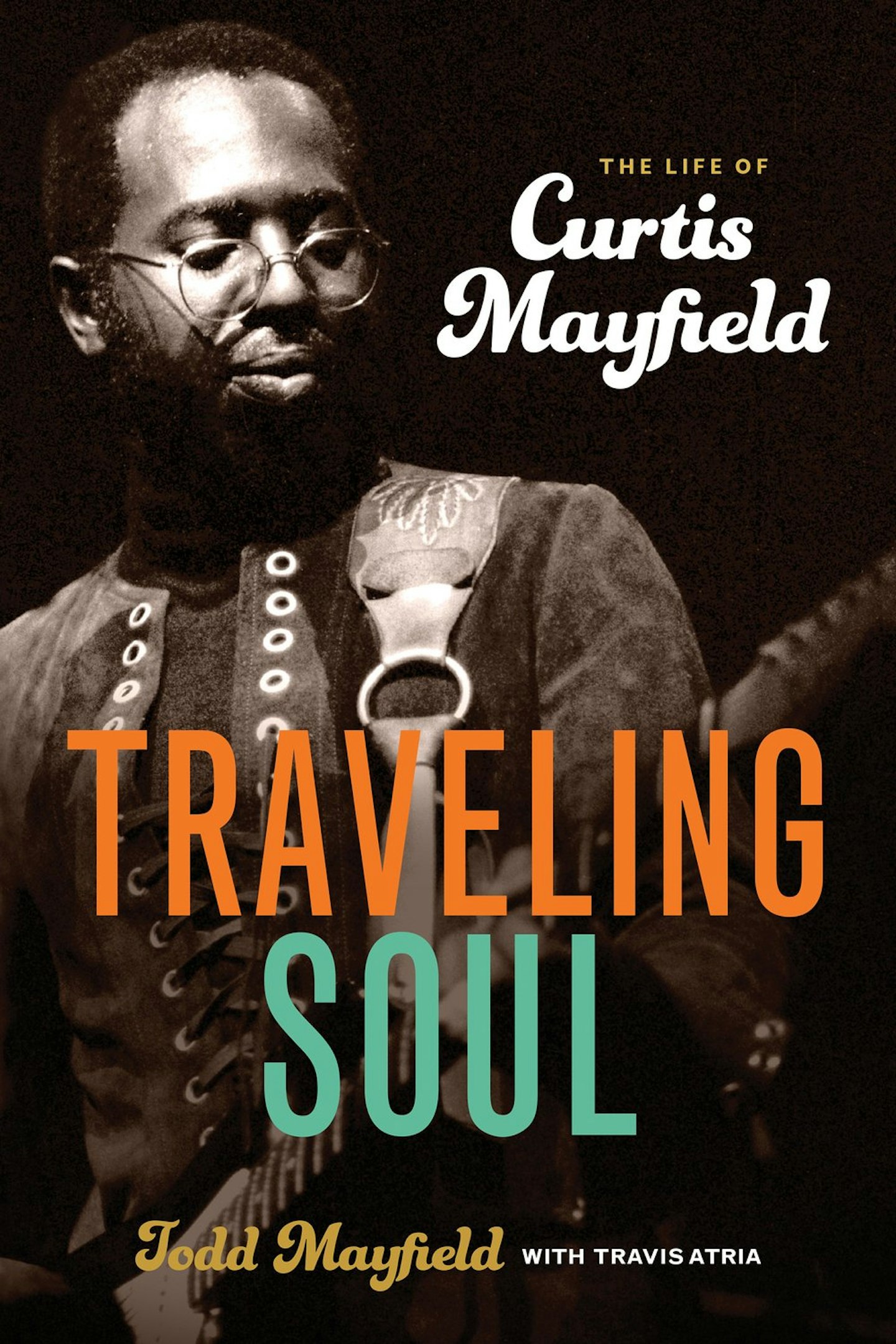
Photo: Gems/Redferns
